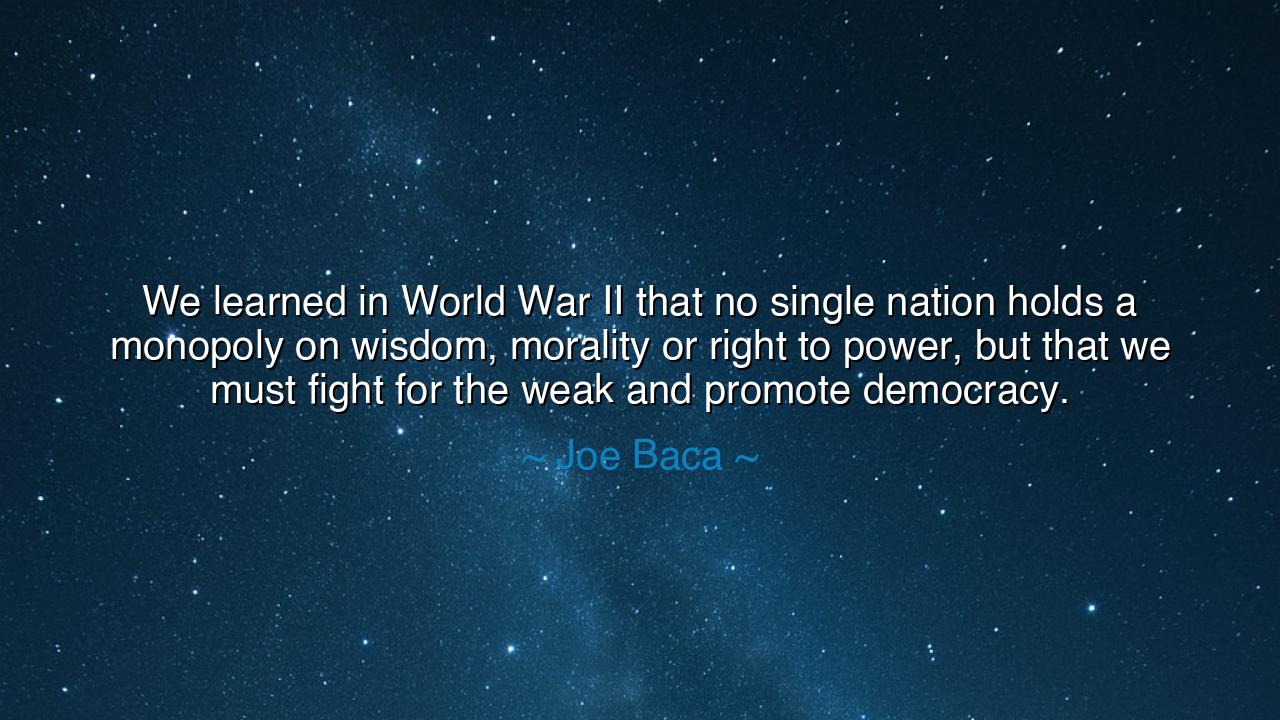
We learned in World War II that no single nation holds a
We learned in World War II that no single nation holds a monopoly on wisdom, morality or right to power, but that we must fight for the weak and promote democracy.






Joe Baca, reflecting on the lessons of the great struggle, proclaims: “We learned in World War II that no single nation holds a monopoly on wisdom, morality or right to power, but that we must fight for the weak and promote democracy.” These words resound like a trumpet across the generations, calling us to remember that the war was not only a clash of armies but a trial of the human spirit. The lesson carved into the ruins of that age is eternal: strength without justice is tyranny, and the duty of nations is not conquest, but the defense of the weak.
The meaning here is radiant with humility. Nations, like men, are often tempted to believe themselves uniquely chosen, destined to rule and to judge all others. But World War II shattered this illusion. No nation, however mighty, is the sole guardian of wisdom, nor the final judge of morality, nor the rightful possessor of power. Instead, when humanity unites—not to dominate, but to uphold the defenseless and to protect the freedom of peoples—then the light of justice shines most brightly.
Consider the story of the Allied soldiers landing at Normandy. They did not storm those beaches for wealth, nor to expand their empires, but to liberate nations that groaned under the yoke of oppression. Young men from distant lands—America, Britain, Canada, and beyond—shed their blood not for their own gain, but so that France might breathe free again. This is the embodiment of Baca’s charge: to fight for the weak, even when the price is terrible, even when victory is uncertain.
This teaching also exalts democracy. For democracy, unlike tyranny, does not claim that power belongs to one ruler or one nation alone. It is the recognition that dignity is shared, that every voice has worth, that the flame of freedom must be guarded by all. World War II taught that when democracy is trampled in one land, it is threatened everywhere; and when it is defended, all nations are strengthened together.
Therefore, let future generations remember: no nation, however proud, is beyond error, nor above the call to humility. The true greatness of a people lies not in their dominion over others, but in their courage to defend the defenseless and their resolve to protect freedom. For in doing so, they become not only strong but just, not only powerful but righteous. And this, above all, is the wisdom that endures beyond the ashes of war.






LNLinh Nguyen
This quote feels like a moral compass grounded in history. It’s refreshing to hear someone acknowledge that power without empathy leads to ruin. Yet I wonder whether the world today still believes in those same postwar ideals. Global politics often seem driven more by strategy than by principle. Can true democracy survive if it’s treated as a tool rather than a moral commitment? Maybe the real lesson is that humility sustains freedom.
BKbird kiwi
I appreciate the humility in this message. It’s a reminder that even victorious nations can’t claim moral perfection. The emphasis on protecting the weak and supporting democracy speaks to shared human responsibility. But I can’t help asking—what happens when democracy itself becomes weaponized or hypocritical? It’s easy to preach liberty abroad while failing to uphold it at home. Baca’s words feel like a challenge to live up to our own ideals.
DDihoibai
This reflection strikes me as deeply idealistic, yet it carries a sharp truth. The Second World War exposed how fragile morality becomes when nations chase unchecked power. I admire Baca’s belief in defending the weak, but it makes me wonder—do governments still act from that motivation, or has self-interest taken over? Maybe the hardest part isn’t learning history’s lessons, but applying them when doing the right thing demands real sacrifice.
SNSang Nguyen
I find this quote both patriotic and universal. It acknowledges the moral lessons of history while warning against arrogance. The idea that democracy and compassion must be actively defended feels as relevant now as ever. Still, I question how nations can balance promoting democracy with respecting sovereignty. Can intervention on behalf of the weak ever avoid becoming another form of dominance? It’s a noble principle, but one full of moral complexity.
TTjtbrb
This statement reminds me how humility and responsibility are intertwined in global politics. It’s a powerful lesson—that moral superiority doesn’t belong to any one nation. But I wonder if humanity truly learned this from World War II or if history keeps repeating itself in subtler forms. Do modern powers still act as though they alone know what’s right? Maybe Baca’s point is a call to self-awareness as much as to collective duty.